MercoPress. South Atlantic News Agency
Tag: Falkland Islands
-
Thursday, December 18th 2014 - 18:17 UTC
'Falklands Legend Don Bonner dies aged 87'
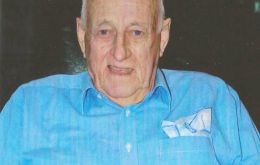
It is with regret that the Falkland Islands Government learned that Donald ‘Don’ Bonner passed away on the morning of Tuesday 16th December 2014, aged 87.
-
Thursday, December 18th 2014 - 12:53 UTC
Prime Minister Cameron announces Falkland Islanders to receive medal
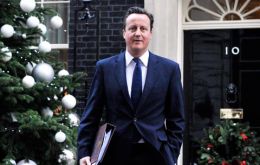
Collective South Atlantic accolade to be presented next year for 'serious and grave threat' to sovereignty. Baroness Thatcher statue also to be unveiled.
-
Thursday, December 18th 2014 - 04:45 UTC
Holdout funds, Malvinas: Mercosur presidents back Argentina
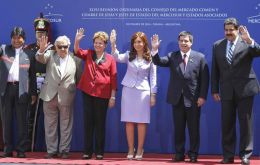
Full support also expressed for Venezuela against sanctions from the administration of United States President Barack Obama.
-
Thursday, December 18th 2014 - 02:34 UTC
South Atlantic: “Fewer catches as illex squid season ends”

The Argentine jigging fleet captured nearly 150,000 tonnes of squid (Illex argentinus) in South Atlantic waters during the season that took place between 24 January and 31 August this year, according to a technical report issued by the National Institute for Fishing Research and Development (INIDEP).
-
Wednesday, December 17th 2014 - 19:41 UTC
Falklands has a new Director of Health; Mr Bainbridge takes his position next January

The Falkland Islands Government is pleased to announce the appointment of Mr Ian Bainbridge as Director of Health and Social Care, taking up post from 28th January 2015.
-
Friday, December 12th 2014 - 06:54 UTC
Record year for Falklands' fish catches
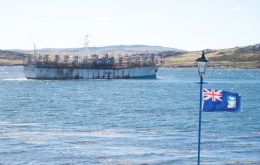
THIS year will be marked as one of the most successful years in the history of the Falkland Islands fishery with several record catches registered and the total catch of all species in Falkland waters this month reaching a record of 451,000 tonnes.
-
Thursday, December 11th 2014 - 12:27 UTC
BBC team authorized to film wildlife in Tierra del Fuego under certain conditions

A BBC crew is currently filming in Tierra del Fuego a documentary on the wildlife of the Beagle Channel Islands. The crew is escorted by an observer from the provincial government and according to local officials it had to sign a document by which when the material is edited it must clearly establish that it was filmed in Argentine territory, with support from local authorities.
-
Wednesday, December 10th 2014 - 08:02 UTC
Falklands' sovereignty bilateral talks requested by leaders' summit in Mexico
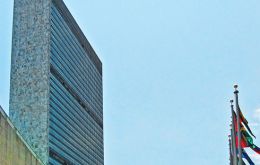
Argentina managed to include a special statement on the Falklands/Malvinas question, at the end of the Ibero American leaders summit held in Mexico, calling on both sides of the dispute, Argentina and the UK, to resume negotiations, in the shortest time possible, to reach a peaceful solution to the sovereignty dispute over the Malvinas, South Georgia, South Sandwich islands and surrounding maritime spaces.
-
Wednesday, December 10th 2014 - 07:33 UTC
Churchill sent troops to the Falklands in 1942 fearing a Japan-Argentina entente

Winston Churchill dispatched 1,700 troops to the Falkland Islands in 1942 out of concern that the Japanese were planning to invade the territory and interfere with critical sea routes in the South Atlantic. In support of this plan Tokyo allegedly was prepared to hand control of the Falklands to Argentina, according to a piece in the Daily Telegraph, credited to Julian Ryall, from the Japanese capital.
-
Monday, December 8th 2014 - 23:46 UTC
Reconciliation and commemoration: 100 years after the Battle of the Falklands German flags fly over Stanley

“With substantial losses at both the Battle of Coronel and the Battle of the Falklands, the annual remembrance events are an opportunity to reflect on the lives lost from both the British and German navies. It was decided early on that this commemorative approach, highlighting the tragic loss of life during both battles, should be echoed throughout events on this Centenary year”
